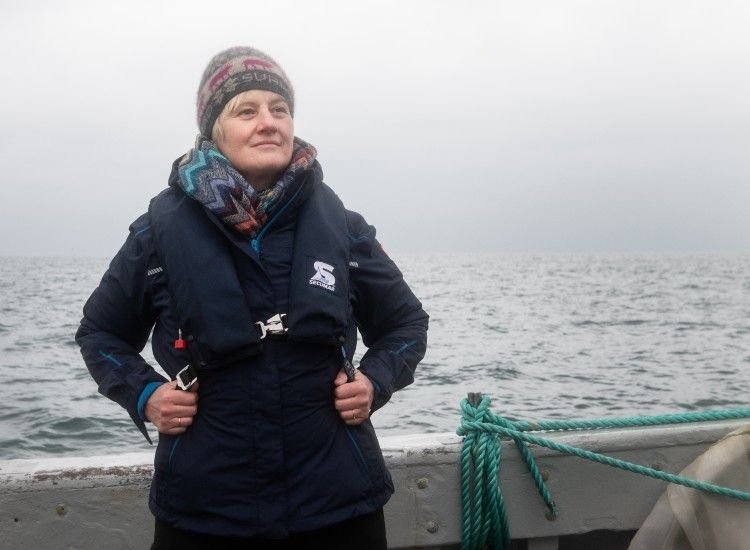We’ve done the science — let’s get on with climate action
Posted on: 03 November 2025
Marking the launch of Trinity's Climate Gateway, Professor Karen Wiltshire issues a call to action: "This is no longer about whether climate change is real. It’s about how we adapt and how we mitigate — decisively, collectively, and intelligently."

By Professor Karen Wiltshire
For three decades now, I have watched the Earth warm — not through headlines or politics, but in my own data. Every year, the evidence has become clearer. My colleagues have measured rising CO₂ levels in Antarctic ice cores. We have seen ice caps retreat, permafrost melt, ecosystems shift, and species vanish. Every single working day of my life has been a front-row seat to a planet in rapid transformation.
As a scientist, I’ve had the privilege — and the burden — of seeing this unfolding crisis through precise measurements and peer-reviewed evidence. At the same time, as a mother, I’ve watched my children and their generation protest, demanding a future they can live in. They are right to fight. The data is irrefutable: the planet is warming — fast.
Some argue that the Earth has always gone through warm and cold phases. That is true, but irrelevant. Never before in our human history — the time of Homo sapiens — have we been so numerous, so settled, and so dependent on stable coastlines, fertile soils, and predictable weather. When the last Ice Age ended between 20,000 and 12,000 years ago, there were only a few humans on the move, following food and shelter.
We are now eight billion souls, rooted in cities and nations that cannot simply relocate as the climate shifts beneath us. As we watch small island nations begin to drown and ecosystems falter under stress, it can feel like a waking nightmare. The fact is that no amount of personal wealth or disbelief will shield anyone from the reality that lies ahead. The future is a very warm one.
Yet we all weary of the drama. The fear-driven headlines, the apocalyptic language, and the sense of paralysis that now accompany climate discussions do not serve us anymore.
Surveys have shown exceptional support from the Irish public for climate action. In 2024, the EPA’s Climate Change in the Irish Mind survey found that 81 percent of people in Ireland are worried about climate change, 75 percent think extreme weather poses a moderate or high risk to their community over the next 10 years, and 79 percent say climate change should be either a “very high” or “high” priority for Government.
This is great news and should be seen as such.
We need to stop catastrophising — and start acting. The data is solid, the diagnosis is clear, and the solutions are known. This is no longer about whether climate change is real. It’s about how we adapt and how we mitigate — decisively, collectively, and intelligently.
Climate migration is no longer a prediction; it is here. People are already being displaced by heat, storms, drought, and rising seas.
Debates about whether we should take in climate refugees miss a deeper truth: many of these people would still have homes if global emissions had been curbed earlier. We share both the responsibility and the opportunity to respond with compassion and foresight.
We have extraordinary tools at our disposal: clean energy technology, restoration science, sustainable agriculture, and innovative engineering. We also have decades of work from global scientific teams — thousands of researchers who have come together through the IPCC to provide the most comprehensive assessment of our planet ever undertaken. Never in human history has there been such a concerted, international effort to understand and address a common threat. We know what is happening. We know what it threatens — our ecosystems, our societies, and our very sense of stability.
Ireland, like every other nation, must prepare — for drought, for stronger storms, for sea-level rise. But that is not cause for despair. We are an adaptable, inventive, and resilient people. Across communities — from cities to coastal towns like Dingle (home of the Dingle Hub) — Irish people are already demonstrating practical, local climate action.
This is what we must amplify: self-help, collaboration, and creativity in the face of change.
And just to put one myth to rest: the Gulf Stream is not going to stop tomorrow. It is largely wind-driven, influenced by the rotation of the Earth itself. Even if, centuries from now, the melting of all polar ice alters its strength, that will not happen overnight. In fact, some cooling of ocean currents in the far future might even temper extreme warming in our region.
The point is not to terrify ourselves, but to act — sensibly, swiftly, and together. The science has done its job. It has spoken with precision and consistency for decades. Now, it is time for society to listen, to mobilise, and to build a future defined not by fear, but by courage and ingenuity.
Because we can do this. We have the knowledge, the means, and — if we choose it — the collective will.
At Trinity College Dublin, where I work as Professor of Climate Science, we want to show, and not just tell, how we mean to proceed. This is why we are launching a new Climate Gateway, a central portal to all that we do for the climate.
We cannot just be bystanders. We need to act as a collective.
- Professor Karen Wiltshire is Professor of Climate Science in Trinity College Dublin and leads the Climate Gateway at the university.
Media Contact:
Catherine O’Mahony | Media Relations | catherine.omahony@tcd.ie
